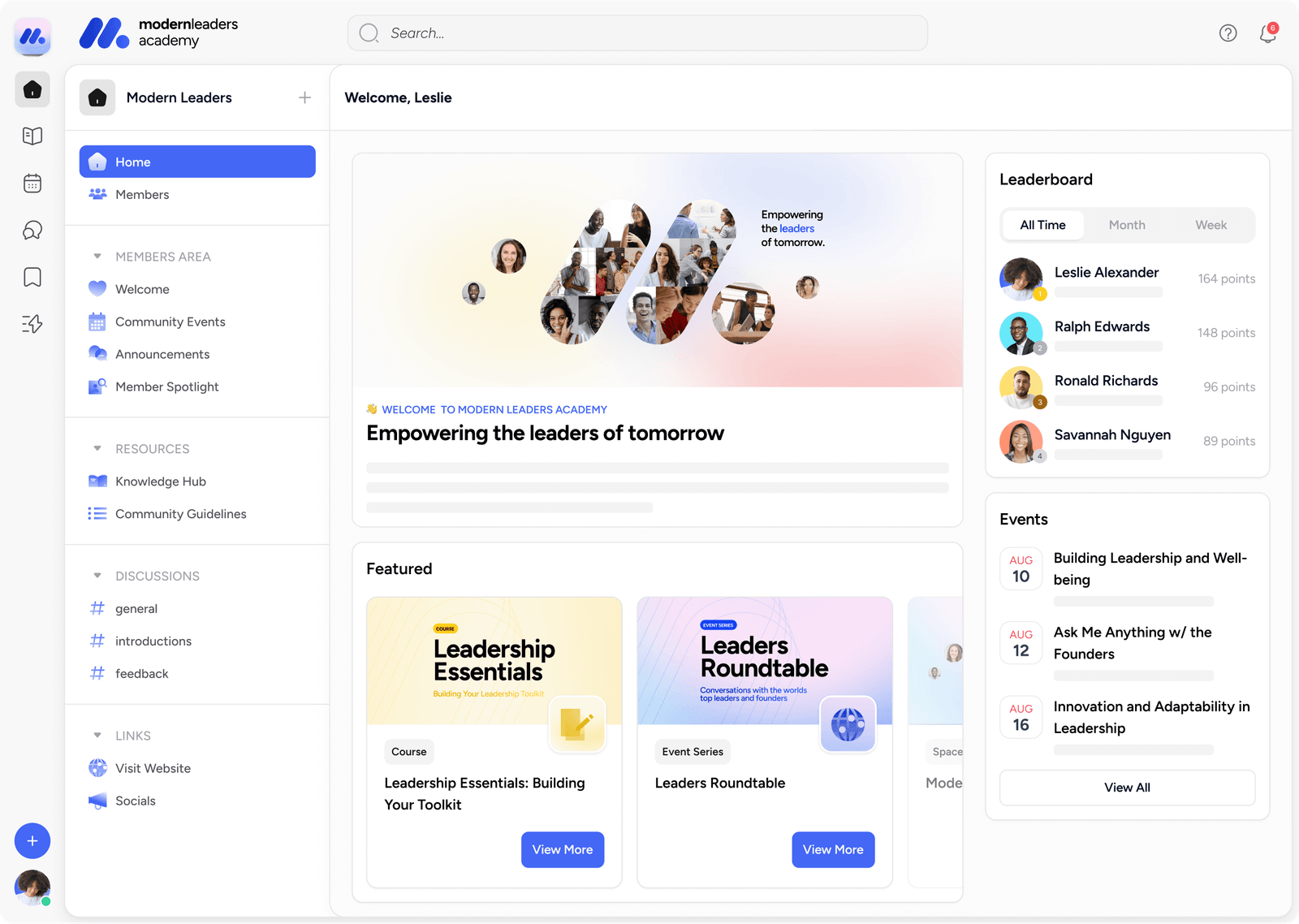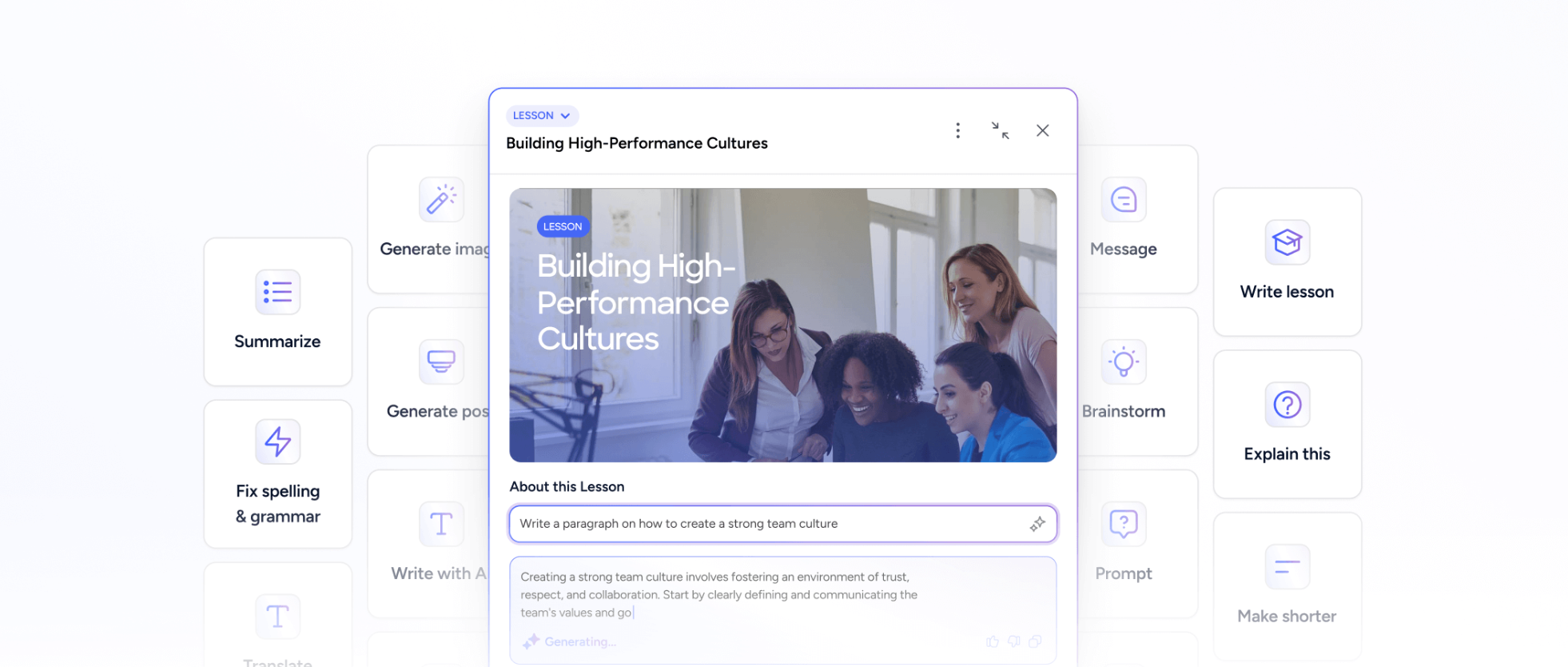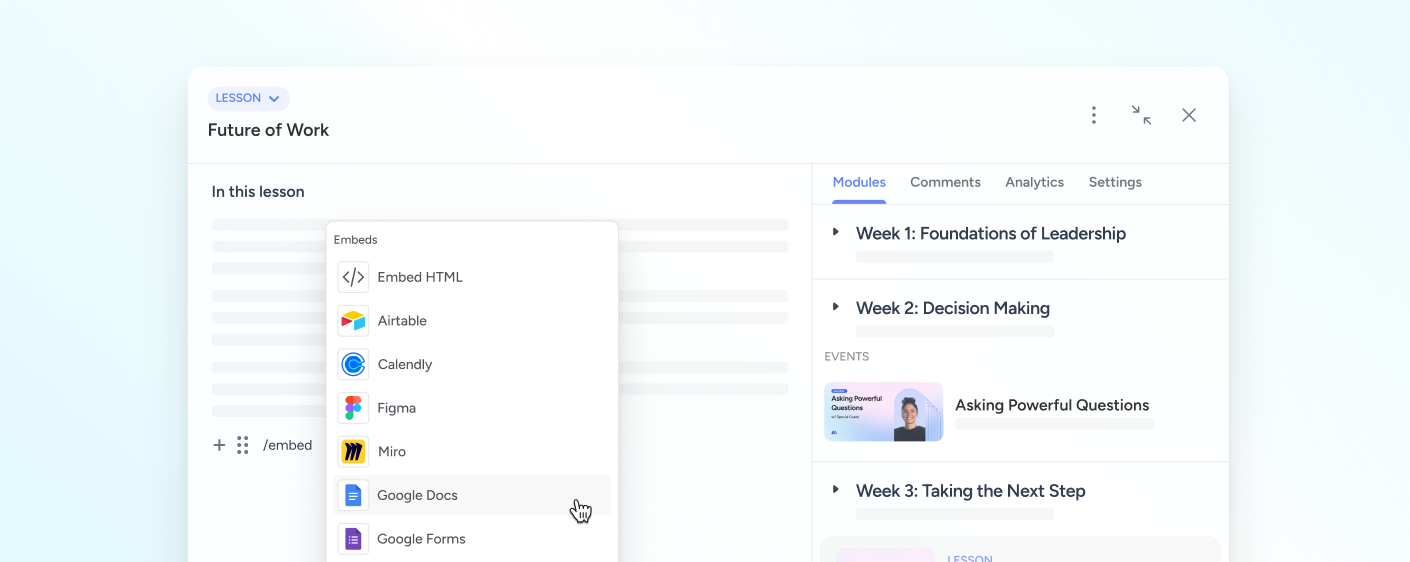5 Best Social Learning Platforms in 2026 (+Theory Explained)

TL;DR
- What it enables: Social learning platforms enable collaborative, interactive education through peer observation, imitation, and community-driven knowledge sharing.
- What it includes: Discussion forums, gamification, AI tools, video conferencing, analytics, mobile access, and social media integration.
- Key elements: Seamless learning-community integration, extensive customization, intuitive design, powerful analytics, and collaborative authoring capabilities.
- Top 5 for 2026 include: Disco, NovoEd, 360Learning, Miro, and Noon offering AI-powered and enterprise-focused solutions.
- Why it matters: Increases engagement, improves knowledge retention, boosts completion rates, and creates accountable learning communities.
What is social learning?
Have you ever found yourself in a new job, quietly observing a more experienced colleague as they navigate complex software with finesse? Can you recall how you watched their every click and keystroke, taking mental notes on how they manage tasks so efficiently?
Did you then find yourself trying out these observed techniques, tweaking them through trial and error until you too mastered the system? If this rings a bell, you've experienced social learning theory firsthand.
The concept of social learning originated from the theory proposed by psychologist Albert Bandura. He advocated that observation, imitation, and modeling are integral to learning, highlighting the significant part played by social interaction and cognitive processes.
Over the years, Bandura refined the theory, underscoring the importance of observational learning, imitation of behaviors, and the influence of associated rewards and punishments.

In the present context, modern learning methods integrate the core principles of social learning theory. The contemporary understanding of social learning suggests that social behavior is acquired not just individually, but also collectively through online learning and other modern learning techniques.
Modern social learning platforms like Disco, incorporate these principles through gamification, positive reinforcement, rewards, and the development of inclusive community-powered learning. They also enable learners to utilize social media for sharing and modeling behaviors and outcomes.
Simply put, modern social learning platforms:
- Merge the foundational principles of social learning theory with technology
- Craft an engaging and interactive learning experience
- Bring the social aspect to the forefront of learning
- Foster a sense of community
- Facilitate a deeper understanding through peer learning and critical thinking
💡 Discover more about what is social learning.
Benefits of social learning in education
Within the education sector, social learning has justified its value by providing transformative learning experiences. Here are the key benefits it brings:
Empower learners to become proactive participants
Social learning empowers learners to become proactive participants in societal change and transformation processes. The key here is active learning - a component that encourages learners to engage not just with the material but also with their peers. This heightened level of engagement creates a conducive environment for increased creativity and innovation.
Gamification transforms mundane lessons into exciting challenges, making learning a fun and interactive experience. By incorporating elements like points, badges, and leaderboards, you can motivate students to participate actively and strive for excellence. This approach not only enhances engagement but also fosters a sense of accomplishment and camaraderie among learners.
Leveraging a robust social learning platform like Disco ensures you have the tools to track and analyze student engagement effectively. This data-driven approach allows you to identify areas where students excel and where they might need additional support, creating a more personalized and impactful learning journey.
See firsthand how Disco integrates gamification to elevate the learning experience:
Intensify knowledge retention among students
Social learning enhances knowledge retention among students by providing interactive cohorts, and discussion forums, fostering collaboration, and promoting critical thinking. By leveraging social learning tools like discussion boards, video conferencing, and social media integration, these platforms foster a collaborative learning environment that is dynamic, interactive, and conducive to learning.
Enhance learner completion rates
When learning with peers, students tend to be more accountable on their learning journey. Learning with others motivates them to learn and complete their courses since they feel a sense of belonging and realize they are not alone in their educational endeavors.
Incorporating social learning into your program can make a significant difference, resulting in higher course completion rates and a more engaging learning experience.
Social learning platform vs traditional LMS
As we explore the world of social learning platforms, comprehension of their distinction from traditional learning management systems (LMSs) becomes important. While both encompass similar features such as analytics, efficient course design, SCORM compatibility, and user management, there’s a marked difference in their emphasis.
A traditional LMS focuses on course creation and management, centralized record keeping, and monitoring course completion and learner progress.
Yet, a social learning platform has advanced a step beyond. They incorporate distinguishing features such as video conferencing tools, social media integration, and convenient notifications, all within a design that offers a human context to the learning experience.
This encourages more active and dynamic learner participation, differentiating social learning platforms from traditional LMSs, and positioning them as a comprehensive social learning management system.

Within an educational setting, social learning platforms offer substantial benefits, including:
- Enabling face-to-face learning
- Endorsing online and blended learning solutions
- Simplifying course design and analytics
- Cultivating learner engagement through interactive elements like forums, discussion boards, and group projects
These features help foster collaborative learning among students, making social learning platforms a preferred choice over traditional LMSs.
Key features of social learning platforms
Social learning platforms, also known as collaborative learning platforms, are equipped with a wide range of collaborative learning tools that create an engaging and effective learning experience.
Discussion threads and live events are other integral social learning features, facilitating knowledge sharing, collaboration, and engagement among participants.
What makes social learning platforms stand out? At the core of these platforms lie social media-like functions that enhance learning by facilitating communication and collaboration. They enable:
- Interaction with mentors, coaches, instructors, and other learners
- Creating a dynamic and interactive learning environment
- Underpinning both social and collaborative learning experiences.
These platforms also incorporate essential characteristics that facilitate collaborative learning. Some of these characteristics include:
- Video conferencing tools
- Social media integration
- Convenient notifications
- Capability to manage and deliver other types of educational programs
Top 5 Social Learning Platforms for 2026 (Free/Paid)
With the progressing digital age, the panorama of social learning platforms is consistently evolving, with the emergence of new platforms and continuous innovation of existing ones. So, which are the top social learning platforms for 2026? Let’s take a closer look at the frontrunners in this space:
- Disco. The #1 AI-powered social learning platform
- NovoEd. The collaborative learning platform for enterprises
- 360 Learning. Ideal for Workforce Development
- Miro. An Interactive Whiteboard Platform
- Noon. A Gamified Learning Platform for Teachers and Students
Each of these platforms brings a unique set of features and benefits to the table, catering to a wide range of learning needs and preferences. Whether it’s the Disco AI tool that helps educators create courses 10x faster or Eduflow’s polished and user-friendly interface that streamlines course creation and attendance processes, these platforms are a testament to the transformative potential of social learning.
#1. DISCO: The #1 AI-powered social learning platform
Disco reigns supreme in the domain of social learning platforms, securing the top spot with endorsements from leading virtual academies such as the Schulich Academy, The Ivey Academy, Coding Temple, and many others
Its innovative suite of AI-driven tools, comprehensive learning programs, and integrated community features position Disco not just as a platform but as a transformative learning partner.

With Disco, educational businesses can customize their branding and learning experiences, while its robust engagement tools ensure that learners are part of an interactive and vibrant educational ecosystem.
Real-time communication, personalized notifications, and a user-friendly interface support active participation and a collaborative learning journey. Here's why Disco is the unparalleled choice for a social learning platform:
AI-first approach
Among thousands of LMS, Disco stands out by integrating its own AI native tool directly into its social learning platform. Disco AI is versatile, working seamlessly with both learning tools and community management. It can generate various content formats, from texts, images, and video assets, to course outlines, curriculum, and quizzes.

On the community side, Disco AI acts as a helpful assistant, answering member queries, identifying ways to boost engagement, and providing actionable prompts.
Get a glimpse of how Disco AI re-engage inactive members:
Learning and community tools are integrated seamlessly
To make learning truly 'social', a platform must combine learning and community elements. This integration allows learners to interact using tools like discussion forums, channels, events, and leaderboards, enhancing both course content engagement and peer interaction.
Disco excels at this by merging these tools into one interface, fostering a vibrant, interactive community and making the learning experience more engaging and enjoyable for everyone involved.

Intuitive interface and modern design
Have you ever bought software that took weeks to figure out how to use? If so, you know the pain of dealing with a steep learning curve. But with Disco, you won't have to endure that frustration.
Thanks to its beautifully designed dashboard, you can get your learning programs up and running in just a day. It's so intuitive that anyone can dive in and start creating without a hitch.
Extensive customization
Disco is not just an intuitive platform with modern design; it is also highly customizable, allowing you to tailor the platform to reflect your brand. It goes beyond basic white-labeling LMS, offering extensive options to modify labels, appearances, and onboarding processes through its Notion-like editor, modular blocks, and drag-and-drop design tools.

When choosing a social learning platform, don't settle for basic customization. Ensure that the platform amplifies your brand and delivers a unique, branded experience to your learners.
Powerful analytics and insights tool
Disco's powerful analytics and insights tool provides educators with a comprehensive view of learner engagement and progress. With features like real-time data tracking, customizable reports, and detailed performance metrics, educators can make informed decisions to enhance their programs.

This tool allows for the identification of trends, strengths, and areas needing improvement, ensuring a data-driven approach to education. By leveraging these insights, educators can tailor their teaching strategies to better meet the needs of their learners, ultimately fostering a more effective and personalized learning experience.
💡 Are you serious about integrating social learning into your learning programs? Start a 14-day free trial and create your social learning environment with Disco!
#2. NovoEd: The collaborative learning platform for enterprises
NovoEd is designed specifically for enterprises, offering a robust platform that supports collaborative and experiential learning. NovoEd's approach is centered on the idea that learning is most effective when it is social, engaging, and rooted in real-world applications.

NovoEd's platform facilitates collaborative projects, social learning, and experiential learning, encouraging teamwork, interaction, and practical application of knowledge. Key features include customizable learning paths, advanced analytics for tracking progress, integration capabilities with other enterprise systems, and mobile accessibility for learning on the go.
💡 Read more: NovoEd reviews
#3. 360Learning: Ideal for workforce development
360Learning aids in workforce planning by enabling organizations to create tailored career and skills paths, synchronize learning opportunities with workforce planning, and utilize AI to provide pertinent training for upskilling the workforce.

Plus, their mobile learning app for iOS and Android is equipped with features including Collaborative Learning, cross-platform catalog, offline mode, and push notifications.
360Learning offers a range of top features that make it a standout platform for workforce development. Key features include collaborative authoring for diverse course content, globalization capabilities for global organizations, in-depth reporting and analytics for data-driven decisions, a robust feedback system for continuous improvement, and AI-powered skills management to align training with organizational goals.
💡 Learn what users think: 360Learning reviews









